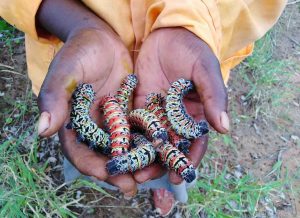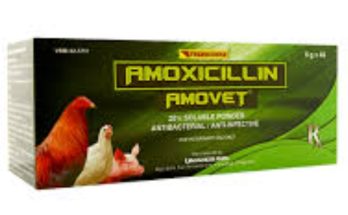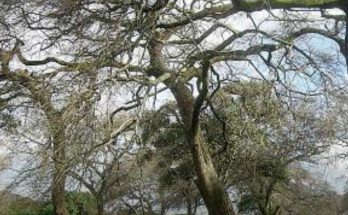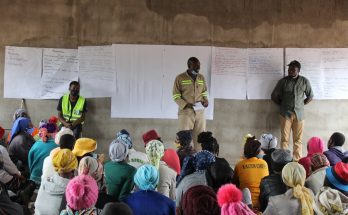
By Nesia Mhaka
FOR as long as anyone can remember, mopane worms have provided a critical source of nutritional and financial sustenance for Zimbabweans, especially in the country’s southern-most provinces.
In recent years, civic leaders and scientists have turned to the lowly invertebrate, enlisting it to help mitigate poverty and pondering its adaptation to climate change.
Now, the mopane worm which is in fact not a worm at all but the leaf-eating caterpillar of emperor moth has once again flexed its power, by aiding the economy in the cattle-ranching town of Gwanda, in the southern part of the country.
Unlike other good years, where rainy seasons in Gwanda used to be followed by a bumper harvest of mopane worms, climate change has resulted in a shift in the distribution and abundance of Mopane worms within Gwanda district, affecting the livelihood of the rural population.
Mopane worms are among a host of high-protein, low carbon-footprint insects now being studied as an antidote to malnutrition. The benefit of the worms in Zimbabwe is seen most clearly in the informal economy, where they play an important role as both supplemental nutrition for rural families and a valuable item to barter and generate income.
Southern Alliance for Indigenous Resources, (SAFIRE) interventions under the “Harnessing Mopane Worm Value Chain, Biodiversity Protection, Ecosystem Services, and Resilient communities’ project which falls under the USAID Southern Africa funded Resilient Waters Program has come up with interventions and trainings that range from sustainable harvesting, Natural Resources Management, Post-Harvest, Business Management and Marketing have managed to change the way the communities in Gwanda ward 15 Manage and utilise their Mopane worm.
In an interview, former cross-border trader Mrs Sarah Madamu a married mother of three in Gwanda ward 15 said the business of harvesting and selling the worms was easy as it does not require any capital investment compared to cross-border trading which is also risky.
“Firstly, I want to thank SAFIRE and USAID for introducing this profitable project in our community, I was into cross border trading which was very risky because I used to cross illegally since I don’t have a passport. Now I have suspended cross-border trading and doing the mopane worm business full time.
“I started selling amacimbi last year December, this has enabled me to add two rooms, my rural second home and pay primary school tuition for my three children.
Mrs Bupilo Moyo, said she used to struggle to survive by doing piece jobs in Gwanda town and sometimes selling cabbages in the border town of Beitbridge, a business she said did not make much money.
“I started seriously harvesting and selling the worms this year and in the short period I have been doing this, I have managed to raise money to sustain my family and pay school fees for my children.
“I used to do piece jobs in Gwanda town and I was struggling to survive from the little money that I got. But through harvesting and selling worms here I have managed to raise money which I will use to start a poultry project,” she said.
Focal Point Person for Gwanda ward 15 confirmed market linkages introduced by SAFIRE boosted their cooperative.
“As a co-operative this year we managed to sell 100 buckets of undried mopane worm to Forest Commission. We sold at US$25 per bucket and in total we got about US$2500. We want to thank SAFIRE for such linkages because if it were us alone, we were not going to do it.
“And as a co-operative we are hoping to develop and expand since we have managed to establish a concrete starting point.
“We struggled to put food on the table, but with such a vibrant project, we are now able to raise money for schools and put food on the table and all the credit goes to SAFIRE and its partners,” she said.
‘Harnessing the Mopane Worm Value Chain for Biodiversity Protection, Ecosystem Services and Resilient Communities’ project Co-ordinator Mr Partson Makwiramiti said that their hope is to make Matabeleland South province a mopane worm business hub and enable harvesters to sell their products without being exploited.
The project introduced is a joint venture between SAFIRE, being funded by USAID Southern Africa and Chemonics South Africa being the grant manager.
The project is being implemented in two districts of Beitbridge ward 10 and 12 and Gwanda ward 13, 15 and 16 and is aiming to diversify livelihood options for communities by sustainably utilising non-timber forest products.
“Exports should not be conducted in a barter exchange system whereby communities are given second hand clothes or soap in exchange for their mopani worms by middlemen who export them to countries such as Angola and South Africa and make huge profits but they should be business minded and receive maximum benefits from this natural resource.
“We want to eliminate the middlemen, we want communities to sell their products the same way maize farmers sell their maize to the Grain Marketing Board (GMB).
“It should be noted that improving and broadening amacimbi business will also improve their economic value, heightening prospects of increased exports to nearby South Africa and Botswana, who have provided ready markets over the years,” said Mr Makwiramiti.



